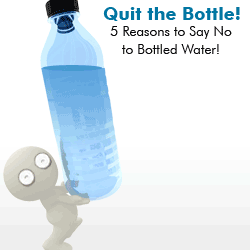
Water and Prostate Cancer

Prostate cancer is mostly thought of as a senior citizen disease, with over 75% of diagnoses made on men over the age of 65. However, this means that over one-fourth of all prostate cancer patients are not yet of retirement age. Therefore, it’s legit to say that taking preventative practice against potential risk of prostate cancer is beneficial for all age group.
Water contaminants and prostate cancer
Certain water contaminants have been linked with higher rates of prostate cancer. These include atrazine, a widely used weed-killer that permeates through the soil into water supplies. Atrazine is particularly prevalent during the springtime when most crops are fertilized. Although the Environmental Protection Agency (EPA) imposes a limit on atrazine levels in water, this limit is based on a yearly average, meaning low levels during off-season can off-set alarmingly high levels during the growing season.
Another outside contributor to developing prostate cancer is the plastic packaging used for bottled water. Multiple studies have shown that the toxic chemicals used to create plastic packaging can break down and seep into the water within, wreaking havoc on the body. Prostate cancer is especially sensitive to environmental factors, making bottled water a particular concern. Avoid large water containers whenever possible, as these transmit the highest levels of toxins.
Dietary Tips for Prevention
A diet high in fiber is credited with reducing the risk of contracting prostate cancer. However, in order for a high-fiber meal plan to be effective, one must drink at least one cup of water for every 20 pounds of body weight daily, and supplement their diet with additional sources of calcium, zinc, and iron. Drinking the required amount of water provides as much as one-third of the recommended daily intake of calcium.
Consuming a minimum of eight glasses of atrazine-devoid, non-bottled water each day keeps your body running at its best to prevent cancer from the start, helping to eliminate toxins from the body and keeping the prostate in working order.
Water and Prostate Cancer Treatment
There is hope for those who have already been diagnosed with prostate cancer. Over 70% of diagnosed men die from causes not related to their cancer, and many can go on safely with no treatment, under the supervision of a physician.
Water consumption is of even greater importance for those who already have prostate cancer. Certain hormones affected by the cancer also regulate bodily processes like water regulation, and when the body is dehydrated, these hormones are unable to work effectively. Thirst is a sign that the body is already dehydrated; so don't wait until you feel the urge—keep drinking water throughout the day. Consuming adequate amounts of water each day can help to maintain good health and a strong immune system to help in your battle against cancer.

